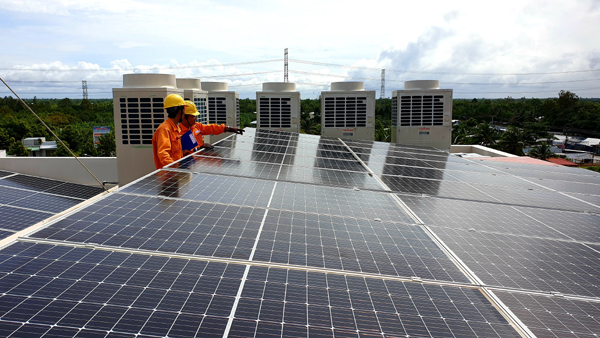Who will be in charge of recycling solar panels?
According to the HCM City Power Corporation, as of November 1, 2020, there were 11,281 on-grid rooftop solar power systems in the city with the total capacity of 192 MWp. There are over 70 off-grid solar power works. The total capacity of electricity provided to the grid in the first 10 months of the year reached 52 million kwh.

As for solar power farms, Electricity of Vietnam (EVN) said more than 100 projects had been put into operation with total capacity of 6,314 MWp, or 5,245 MWac, of which nearly 90 projects became operational in Q2 2019 alone with total capacity of 4,000 MWp.
The solar boom has created diversity in supply sources for the national power system, helped mitigate the risk for electricity outages, and has been applauded by people, investors and authorities.
However, there are always two sides of a coin. Ksor H'Bo Khap, a National Assembly deputy at the ongoing National Assembly session, expressed his worry about the rampant development of solar power systems in Gia Lai.
“What will the solar panels be used after they expire?” was the question raised by the deputy to Minister of Industry and Trade Tran Tuan Anh.
This is a big concern. If they cannot be properly recycled, they will become hazardous waste polluting the environment.
However, some scientists say that the situation won’t be as serious as people think. The problem is anticipated and the solutions to it have been figured out.
| According to the investors, under the contracts signed between the investors and solar panel suppliers, the suppliers will retrieve the panels for treatment after 20 years, when the life cycle of the panels ends. In order to do this, suppliers usually add an additional charge to the selling prices. |
“There is a concern that solar panels would go to landfills which will pollute the environment. I can say for sure that this won’t happen. The world has enough technologies to recycle and treat what science creates to the very end,” he said.
“Solar panel suppliers have the responsibility of collecting the expired panels for treatment, or they will be punished,” he said, adding that Vietnam should learn from other countries to prepare for the future of solar power in Vietnam.
The factory that recycles these panels is operating at 4-14 percent of total installation capacity, but the figure will increase rapidly in the near future because of the rapid development of solar power.
In some EU countries, at least 65 percent of panels must be collected by suppliers for recycling.
How about Vietnam?
However, in Vietnam, who will be responsible for collecting the panels for recycling?
VietNamNet’s reporters raised the same question to investors of solar power projects when they visited projects under construction in Long An and Tay Ninh in April 2019.
According to the investors, under the contracts signed between the investors and solar panel suppliers, the suppliers will retrieve the panels for treatment after 20 years, when the life cycle of the panels ends. In order to do this, suppliers usually add an additional charge to the selling prices.
How can one force the suppliers to fulfill their commitments? An investor who is developing many solar power projects told VietNamNet on November 13 that ‘suppliers understand that solar panels are recyclable which can bring profits, so they add a provision on solar panel to be recalled to the contracts so they can make double profits’.
The solar panels most commonly used in Vietnam are silicon photovoltaic panels, and most of the components used to make the panels are recyclable.
“Recycling solar panels will bring profits,” he said, adding that in waste treatment, collecting 90 percent is enough to make profit.
“I believe that the recyclers will make a fat profit,” he added.
When asked why a recycling plant has not been built, he said that Vietnam has just begun developing solar power, while the life cycle of solar panels is over 20 years, si there is no demand for having solar panels recycled.
“The number of solar panels which need to be recycled must be high enough to build recycling plants. No one would build plants when the materials are not enough,” he explained.
Cuong thinks that the government should set up a mechanism which forces recycling of solar panels safely. Manufacturers and suppliers must be responsible for recalling, treating and recycling photovoltaic panels or hiring other companies to treat expired panels.
Luong Bang

Limit on capacity continues to hinder solar panel installation
With the rising prices of electricity pushing many enterprises and households to install rooftop solar panels that partly help reduce electricity bills, the cap on solar power capacity is hindering the process.

Rooftop solar power popular in southern provinces
According to the Electricity of Vietnam (EVN), the total capacity of rooftop solar power projects in southern provinces now makes up 60 percent of its total solar power capacity nationwide.
